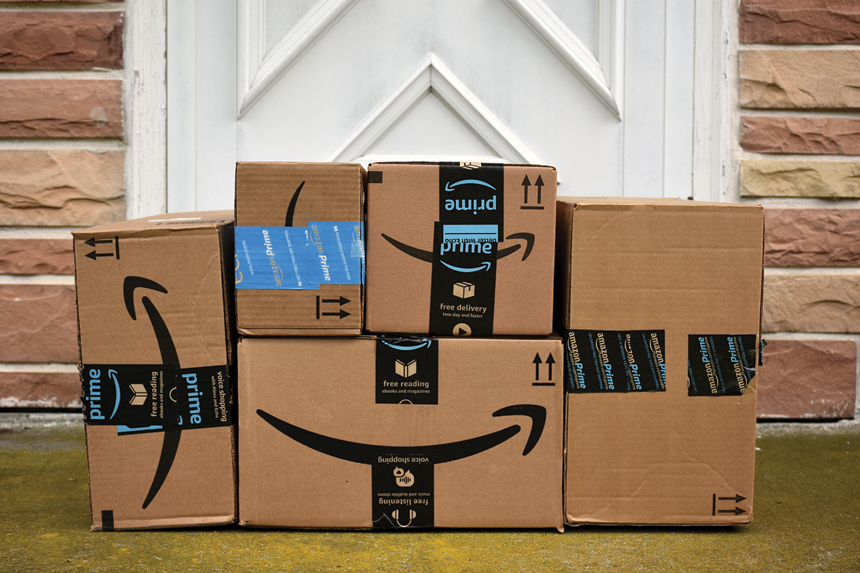Yesterday I went online and bought a Wallet Ninja. I hadn’t realized I needed a Wallet Ninja until a week ago, which is when I read that it’s among Amazon.com’s 10 best-sellers. When a company that lists some 565 million products in the U.S. market announces that the Wallet Ninja (imagine a credit-card-shaped Swiss Army knife) is a runaway hit, count me in. Gotta have one.
Does that suggest I am an easy mark or weak or lazy? Yes. Especially the lazy part. Like millions of others who routinely shop at Amazon’s sprawling website, I am complicit in its takeover of America and all we proudly stand for: unbridled consumerism.
Everyone I know seems to be an Amazon patsy (aka customer). Devotees cut across every religion, political affiliation, and lifestyle. (Some argue that shopping at Amazon is a lifestyle.) The upshot is that Amazon is the least exclusive club in the country but, in some ways, among the most powerful.
To the chagrin of authors, lawyers, and visibly agitated consumer advocates, Amazon has grown into a corporate behemoth. By helping set prices for its vast array of merchandise, it can influence consumer trends as well as broad cultural preferences. And indeed there are potentially dangerous social implications in this. No other web retailer has that kind of clout. Walmart.com claims less than 4 percent of the e-commerce market in the U.S., to Amazon’s nearly 50 percent. Amazon is truly the octopus that swallowed our civilization whole.
Amazon is truly the octopus that swallowed our civilization whole.
Because the company admits it is almost insanely focused on numbers, let me share a few: It did $258 billion in sales in 2018. It’s on pace to become America’s largest clothing retailer by 2021. A year later, the company’s private-label brands are positioned to reach $25 billion in sales. Its annual Prime Day is now tantamount to a national holiday, with more than 100 million products sold to Prime members over a 36-hour period. (Employers take note: 60 percent of that shopping is done from work.)
The truth is that Amazon dominates online sales not only because it’s got everything you could ever want just a click away, but rather because — well, yes, it’s because of that just-a-click-away thing. It’s what in the biz they call “frictionless.” If I want a box of metal paper clips, I can pick them up at any stationery store. But what if I prefer them in teal? Am I going to drive around searching for those? Ain’t gonna happen. I’ll order from Amazon — maybe not at a great price, either, because teal-colored clips are, y’know, scarce. But I’ll have them in a few days. One click.
That means that a store somewhere in my ZIP code has lost a sale, right? Actually, no — because that store probably no longer exists, thanks to Amazon. Retail shops across the country have been slaughtered by the company Jeff Bezos created.
Adding insult to injury, Amazon is now devoting some of its huge cash pile to building its own stores — actual physical buildings in places where there had once been locally owned establishments. Amazon Books, for example, is rolling out as I write. If this sounds to you like dancing on a grave while selling the deceased’s funeral program for profit, you get the point.
But wait, there’s more! The company is currently launching two specialty marts: Amazon 4-star and Amazon Go. An Amazon Bank is rumored. The secret sauce in each instance is extreme convenience, playing to our desire for pampered lives. Amazon Go locations will not even have sales clerks. Or checkout registers. Or scanners. Just stroll out, thief-like, with your bagged goodies. Sensors will invisibly collect codes and bill your account.
Disgusting. No human contact. No warmth.
I’m in.
In the last issue, Neuhaus wrote about his actual neighbor, Mister Rogers.
Become a Saturday Evening Post member and enjoy unlimited access. Subscribe now




Comments
Thanks for your “The Amazon Effect” article. I feel guilty for supporting amazon. However, I wanted to point out to you, Mr. Neuhaus, that the “Effect” began before amazon. I refer to WalMart as a “cancer on the face of the planet.” and refuse to darken its doors. When WalMart targets a city, it very shadow kills local businesses. Every independent entrepreneur is forced to shut its doors, and its owners reduced to become minimum-wage employees of WalMart. WalMart products are produced by slave labor and it pays slave wages. Today my hometown has one WalMart on the sSouth end of town; one on the north end of town; and they recently wanted to open their Sam’s Club. Let me go back another several years. In the early 1990s I owned a small bookstore in Claremont California. Everyone loved it; we had speakers, meetings several nights a week; I served tea; had a table with kids’ games. But when Borders Books and Barnes & Noble moved in a short distance away, my loving customers flocked there to buy books for less money than I paid to get them in my store. Thousands of small independent bookstores went out of business within a few years’ time, including mine. I came back to my Sheboygan, Wisconsin that used to have a wonderful downtown where everyone shopped for everything they needed, where they were waited on by people they knew, where we ate dinner, went for ice cream, went to movies. That downtown was GONE; all the only department stores were now at the mall off the freeway. HUGE parkings lots, empty aisles in stores with no help to find anything; clerks who didn’t know who I was. I’m convinced the owners of those freeway mall stores have NO IDEA where Sheboygan is; have NO CONCERN about a single one of its residents. So I have no loyalty to the megastores that own our malls. Am I going to drive from mall to mall, walk through enormous parking lots from one store to another looking for items they no longer carry? No, if I need something, and one of the remaining local stores does not have it, I go to amazon.
I’m a heavy Amazon shopper. The convenience of shopping at home and having it delivered in 2 days helps me out. I really dislike shopping. The Walmarts I have visited are disorganized and usually do not have what I’m looking for, haven’t visited one in 2 years because of this. Now back to Amazon, about 6 months ago my fridge needed a condenser fan motor, that simple fan cools the condenser and keeps your fridge cold. I called an appliance parts store to see if they had the fan motor. We don’t have that motor in stock but I can order it and have it in 5 days, not good. Went on Amazon, put my information about the fridge in and it took me to the motor I needed. Note this all started on a Friday, Sunday morning at 11 AM I had my motor and installed it in 15 minutes. The price at the local store was $59.99, at Amazon (same motor) $29.99. I value my time and shopping Amazon gives me more time to do the things that are important to me and my family. 80% of my Christmas gifts were purchased on Amazon, why because they had them in stock and the prices were right!!!
Well let’s think this through a little better. Here are just SOME of the many sides to having Amazon in our world.
1. Just think about how much gas and mileage wear and tear we save on our cars, not having to run around all over creation, looking for the wanted items on our list. (Not to mention the amount of traffic and accidents that are eliminated!)
2. Look how much more manufacturers can sell when their customers, or potential customers, can find their unique and/or hard to get items, on their computer screens.
3. Look what a booming business this company is for UPS and/or the mail service who, not that long ago, were REALLY hurting for business!!
4. Look at all the unexpected options/choices you can find for your life, that you didn’t even know existed! I personally am a big believer in “Never limit your options.” in any aspects of your life! Merchandise is just another one of those areas.
5. And just think about all the wonderful things you can do with that freed up time that you’re not having to spend running all around creation getting your things!!! Time is one of the most valuable commodities we have!!
And now having said that… I don’t even shop at Amazon anymore!!! I make a bi-monthly trip to Aldi’s and Walmart, and stay home the rest of the time. And life is so much better for this ex-shopaholic now!! Just sayin’…
I do not shop at Amazon. I don’t really need anything that they sell. I use ebay for stuff. Otherwise, I go to a store, or buy online from the actual place that sells the product. At times it may be a bit more, but, not that much more. I cannot support what Amazon is doing and I am amazed at all of the people who do. That is all.